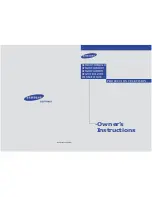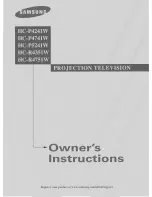
-6
Observe the following safeguards when setting up your projector.
Caution concerning the lamp unit
■
Potential hazard of glass particles if lamp ruptures.
In case of lamp rupture, contact your nearest Sharp
Authorized Service Center or Dealer for replacement.
See “Regarding the Lamp” on page
48
.
Caution concerning the setup of the projector
■
For minimal servicing and to maintain high image quality,
SHARP recommends that this projector be installed in
an area free from humidity, dust and cigarette smoke.
When the projector is subjected to these environments,
the vents and lens must be cleaned more often. As
long as the projector is regularly cleaned, use in these
environments will not reduce the overall operation life of
the unit. Internal cleaning should only be performed by
a Sharp Authorized Service Center or Dealer.
Do not set up the projector in places exposed to
direct sunlight or bright light.
■
Position the screen so that it is not in direct sunlight or
room light. Light falling directly on the screen washes out
the colors, making viewing diffi cult. Close the curtains
and dim the lights when setting up the screen in a sunny
or bright room.
Caution regarding placing of the projector
■
Place the projector on a level site within the adjustment
range (±5 degrees) of the adjustment foot.
■
After the projector is purchased, a faint smell from the
vent may appear when the power is fi rst turned on. This
is normal and is not a malfunction. It will disappear after
the projector is used for a while.
When using the projector in high-altitude areas
such as mountains (at altitudes of approximate-
ly 4,900 feet (1,500 meters) or more)
■
When you use the projector in high-altitude areas with
thin air, set “Fan Mode” to “High”. Neglecting this can
affect the longevity of the optical system.
Warning about placing the projector in a high
position
■
When placing the projector in a high position, ensure that
it is secured carefully to avoid personal injury caused by
the projector falling down.
Do not subject the projector to hard impact
and/or vibration.
■
Protect the lens so as not to hit or damage the surface
of the lens.
Rest your eyes occasionally.
■
Continuously watching the screen for long hours will
cause eye strain. Be sure to occasionally rest your
eyes.
Avoid locations with extremes of temperature.
■
The operating temperature of the projector is from 41°F
to 95°F (+5°C to +35°C).
■
The storage temperature of the projector is from –4°F
to 140°F (–20°C to +60°C).
Do not block the exhaust and intake vents.
■
Allow at least 11
13
/
16
inches (30 cm) of space between
the exhaust vent and the nearest wall or obstruction.
■
Be sure that the intake vent and the exhaust vent are not
obstructed.
■
If the cooling fan becomes obstructed, a protection
circuit will automatically put the projector into standby
mode to prevent overheat damage. This does not indi-
cate a malfunction. (See page
46
.) Remove the projector
power cord from the wall outlet and wait at least 10 min-
utes. Place the projector where the intake and exhaust
vents are not blocked, plug the power cord back in and
turn on the projector. This will return the projector to the
normal operating condition.
■
When turning off the projector, the cooling fan runs to
decrease the internal temperature for a while. Unplug
the power cord after the cooling fan stops. The period
the cooling fan runs will vary, depending on the circum-
stances and the internal temperature.
Caution regarding usage of the projector
■
When using the projector, be sure not to subject it to
hard impact and/or vibration, as this can result in dam-
age. Take extra care with the lens. Before moving the
projector, be sure to unplug the power cord from the wall
outlet, and disconnect any other cables connected to
it.
■
Do not carry the projector by holding the lens.
■
When storing the projector, re-attach the lens cap. (See
page
8
.)
■
Do not expose the projector to direct sunlight or place
next to heat sources. Doing so may affect the cabinet
color or cause deformation of the plastic cover.
Other connected equipment
■
When connecting a computer or other audio-visual
equipment to the projector, make the connections AFTER
unplugging the power cord of the projector from the AC
outlet and turning off the equipment.
■
Please read the operation manuals of the projector and
the equipment to be connected for instructions on how
to make the connections.
Using the projector in other countries
■
The power supply voltage and the shape of the plug may
vary depending on the region or country you are using
the projector in. When using the projector overseas, be
sure to use an appropriate power cord for the country
you are in.
XVZ21000̲E̲Ousyu̲P06-11.indd 6
XVZ21000̲E̲Ousyu̲P06-11.indd 6
2006/07/31 19:53:13
2006/07/31 19:53:13









































